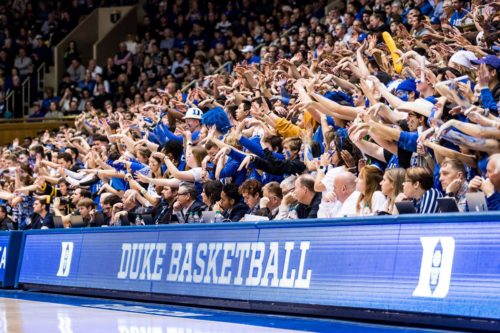Duke announced Tuesday that it will not have fans at Cameron Indoor Stadium for men’s and women’s basketball home games. This will potentially be a huge change for one of the game’s most historic and thunderous arenas.
“As Duke University continues to be an industry leader per providing a safe environment for intercollegiate athletic competition, the decision to maintain our non-spectator protocol is imperative for the overall health and safety of the Blue Devil fan base, student-athletes, coaches and support staff, notwithstanding the immediate campus population comprised of students, faculty, and staff,” athletic director Kevin White said in his statement.
“We will continue to embrace the challenges of this unique if not unprecedented time with flexibility and compliance, and can’t begin to thank our dedicated, passionate fans enough for their unbridled support.”
With this change, a home-court advantage may not be as effective as we’ve once seen in the past. This implication on the limitation of fans may drastically change the attitudes and ways players will play in college hoops this season.
New Circumstances
Similar to the NBA’s situation in the bubble, NCAA players will have to experience a nuanced, quieter version of the game. In an interview with Lou Williams, the basketball player explained how these protocols have affected the NBA in the past few months.
“It forces you as a team to be involved through and through, from the coaching staff to the guys on the floor and to the players on the bench,” Williams said. “It will force everybody to create energy for themselves to be all on the same page and just create some momentum for yourselves.”
With college basketball this season, communication and motivation between teammates will be emphasized by coaches. Since every game is crucial, it’ll be interesting to see how these athletes carry out these actions.
How big of a loss is a fan-less stadium?
No one knows yet for sure in the college basketball realm. Sports psychologists have given their take on these new circumstances. Many have wondered if the lack of crowd response might affect the focus, effort and possible strategy.
Dan Weigand, former editor of the Journal of Applied Sport Psychology, included his thoughts on the topic.
“It’s like a stand-up comic performing in front of a camera instead of a live audience. In our profession, there is a lot of discussion about this. It’s a unique situation and we don’t know what to expect.”
Duke has traditionally won around 90 percent of its home games over the last few decades. Before a massive upset by Stephen F. Austin, the Blue Devils had won an impressive 150 consecutive non-conference home games. These percentages may dip throughout the 2020-21 season now.
You can ‘Like’ The Game Haus on Facebook and ‘Follow’ us on Twitter for more sports and esports articles from other great TGH writers along with Brian!
“From Our Haus to Yours”
